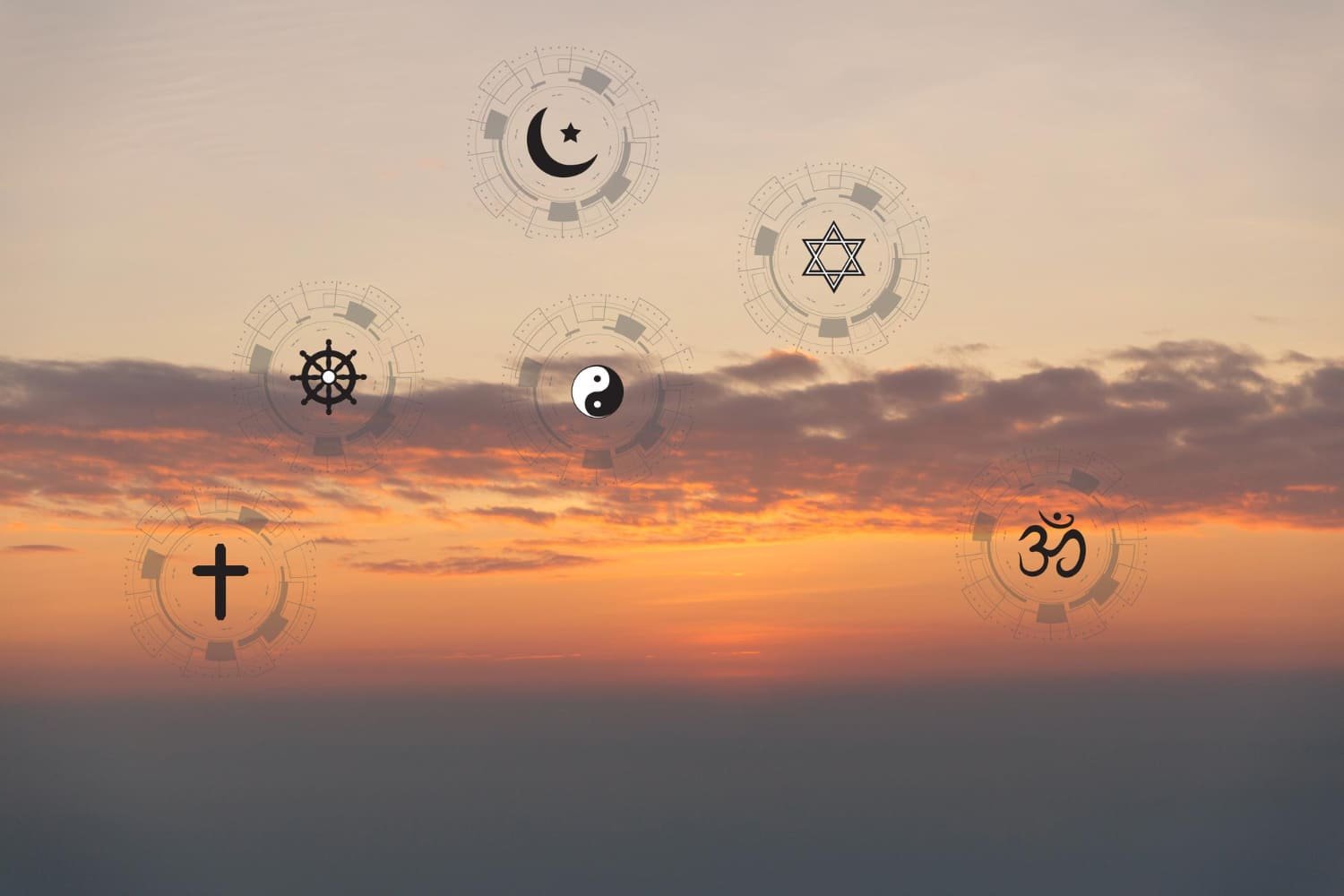Buddhism and Hinduism are two of the most popular religions in the world, both originating in ancient India. While they share some similarities, such as the belief in reincarnation and karma, they also have significant differences in their beliefs, practices, and goals.
One of the most significant differences between Buddhism and Hinduism is their view of the ultimate goal of life.
In Hinduism, the ultimate goal is to achieve moksha, or liberation from the cycle of birth and death, and to merge with the divine. In contrast, Buddhism aims to achieve enlightenment, or nirvana, which is the state of being free from suffering and ignorance.
Another difference is their approach to the concept of God.
Hinduism is a polytheistic religion, with many gods and goddesses, while Buddhism is a non-theistic religion that does not recognize a supreme being or creator. Instead, Buddhists focus on the Four Noble Truths and the Eightfold Path as the means to achieve enlightenment.
Origins and History
Buddhism and Hinduism are both ancient religions that originated in India. Hinduism is considered the oldest religion in the world, with its roots dating back to the Vedic civilization of ancient India, while Buddhism was founded by Siddhartha Gautama, also known as the Buddha, in the 5th century BCE.
Hinduism has a complex history with many different traditions, beliefs, and practices. It is based on the Vedas, a collection of ancient texts that were written in Sanskrit. Hinduism has evolved over thousands of years and has been influenced by many different cultures and religions, including Buddhism.
Buddhism, on the other hand, was founded by the Buddha after he achieved enlightenment while meditating under a Bodhi tree. The Buddha’s teachings were based on the Four Noble Truths and the Eightfold Path, which emphasized the importance of self-awareness, compassion, and ethical conduct.
Over time, Buddhism spread throughout Asia and became a major religion in many countries, including China, Japan, and Thailand. Hinduism also spread throughout Asia and has become a major religion in India, Nepal, and Indonesia.
Overall, both Buddhism and Hinduism have rich histories and have played important roles in shaping the cultures and beliefs of many different societies. While they share some similarities, such as a belief in karma and reincarnation, they also have many differences in their beliefs, practices, and traditions.
Beliefs and Practices
Buddhism and Hinduism have different beliefs and practices. Hinduism believes in the existence of multiple gods and goddesses, while Buddhism does not believe in a supreme being or creator.
Instead, Buddhism focuses on the Four Noble Truths and the Eightfold Path to achieve enlightenment and reach Nirvana.
Hinduism places great importance on the caste system, which divides society into four main castes based on birth. This system determines a person’s social status, occupation, and even whom they can marry. Buddhism, on the other hand, rejects the caste system and teaches that all beings are equal.
Both religions practice meditation and self-reflection, but the methods and goals are different. In Hinduism, meditation is used to connect with the divine and achieve spiritual enlightenment. In Buddhism, meditation is a tool to train the mind and gain insight into the nature of reality.
Hinduism also places great importance on rituals and ceremonies, such as puja (worship) and yajna (sacrifice), while Buddhism does not have many formal rituals. Instead, Buddhists focus on ethical behavior, such as the Five Precepts, which include refraining from killing, stealing, lying, sexual misconduct, and intoxication.
Overall, both religions offer different paths to spiritual enlightenment and have unique beliefs and practices. It is up to the individual to choose which path resonates with them the most.
Major Differences between Buddhism and Hinduism
Buddhism and Hinduism are two of the most popular religions in the world. While they share some similarities, they also have many differences.
Here are some of the major differences between Buddhism and Hinduism:
- Founder: Hinduism has no single founder, while Buddhism was founded by Siddhartha Gautama, also known as the Buddha.
- Beliefs about God: Hinduism has many gods and goddesses, while Buddhism does not believe in a supreme being or creator.
- Reincarnation: Both religions believe in reincarnation, but Hinduism believes in an eternal soul or atman that is reborn, while Buddhism believes in a non-eternal, constantly changing self or anatta.
- Karma: Both religions believe in the concept of karma, but Hinduism believes that good or bad karma can affect a person’s future lives, while Buddhism believes that karma can affect a person’s current life and future lives, but can be overcome through enlightenment.
- Path to Salvation: Hinduism believes in several paths to salvation, including the path of knowledge, the path of devotion, and the path of action, while Buddhism believes in the Eightfold Path to Enlightenment.
Overall, while both religions share some similarities, they have many differences in their beliefs and practices. Understanding these differences can help individuals decide which religion, if any, is right for them.
Similarities between Buddhism and Hinduism
Buddhism and Hinduism are two ancient religions that have similarities as well as differences. Despite the differences, there are several similarities between the two religions.
One of the most significant similarities is the concept of karma. Both religions believe in the law of karma, which means that every action has a consequence. According to both religions, the law of karma is the cause of rebirth and determines the quality of life in the next birth.
Another similarity between the two religions is the concept of meditation. Both Buddhism and Hinduism have a rich tradition of meditation. Meditation is an essential aspect of both religions and is used to achieve a higher level of consciousness and spiritual awareness.
Both religions also believe in the importance of self-realization. In Buddhism, self-realization is achieved by attaining enlightenment or Nirvana. In Hinduism, self-realization is achieved by realizing the true nature of the self or Atman.
Both religions also have a rich tradition of scriptures. In Hinduism, the Vedas are considered the most sacred scriptures, while in Buddhism, the Tripitaka is the most important collection of texts. Both religions have a vast collection of scriptures that provide guidance on how to live a moral and ethical life.
Additionally, both religions believe in the importance of compassion and non-violence. In Buddhism, the concept of compassion is central to the teachings of the Buddha, while in Hinduism, the concept of ahimsa or non-violence is an essential aspect of the religion.
In conclusion, while there are differences between Buddhism and Hinduism, there are also several similarities. Both religions believe in the law of karma, the importance of meditation, self-realization, the importance of scriptures, and the value of compassion and non-violence.
Which One is Better?
It is difficult to determine which one is better between Buddhism and Hinduism. Both religions have their unique beliefs and practices that make them appealing to different people. It ultimately comes down to personal preference and what resonates with an individual.
Some people prefer Buddhism because of its emphasis on meditation and mindfulness practices. Buddhism teaches that suffering is caused by desire and attachment, and that by letting go of these things, one can achieve enlightenment and inner peace.
This philosophy can be helpful for people who struggle with anxiety, stress, or other mental health issues.
On the other hand, some people prefer Hinduism because of its rich cultural traditions and diverse pantheon of gods and goddesses.
Hinduism offers a variety of paths to enlightenment, including devotion, knowledge, and good deeds. It also emphasizes the importance of family, community, and social responsibility.
Ultimately, the decision between Buddhism and Hinduism comes down to personal beliefs, values, and experiences. What works for one person may not work for another. It is important to explore both religions and find what resonates with you personally.
Conclusion
Both Hinduism and Buddhism are ancient religions that originated in India and have influenced the world in many ways. While they share some similarities, they also have significant differences in their beliefs, practices, and goals.
One of the main differences between the two religions is their view of the ultimate reality. Hinduism believes in the existence of an eternal, unchanging, and all-pervading divine reality called Brahman, while Buddhism denies the existence of any permanent or independent reality and emphasizes the impermanence and interdependence of all phenomena.
Another difference is their approach to liberation or enlightenment. Hinduism advocates the way of devotion, knowledge, and action to attain liberation from samsara, the cycle of birth and death, and merge with Brahman.
Buddhism, on the other hand, teaches the way of mindfulness, insight, and compassion to achieve liberation from suffering and ignorance and attain Nirvana, a state of peace, freedom, and bliss.
Despite their differences, both religions offer valuable insights and practices for spiritual growth and ethical living. They both emphasize the importance of self-awareness, self-transformation, and altruistic behavior.
They both recognize the interconnectedness and interdependence of all beings and promote non-violence, tolerance, and respect for diversity.
Ultimately, the choice between Hinduism and Buddhism, or any other religion, is a personal one that depends on one’s individual needs, preferences, and experiences.
It is up to each person to explore and evaluate different paths, seek guidance and support from wise teachers and communities, and cultivate their own inner wisdom and compassion.







